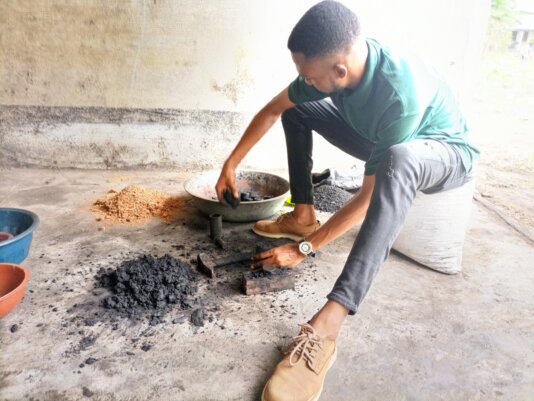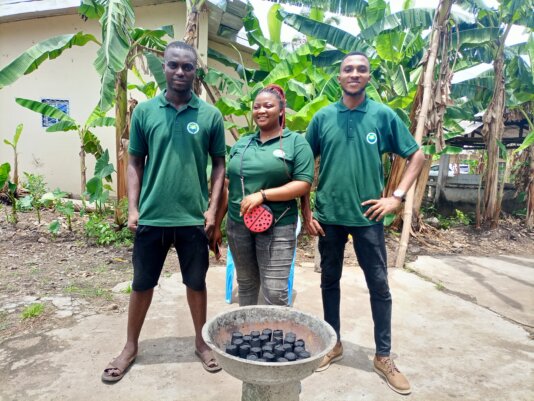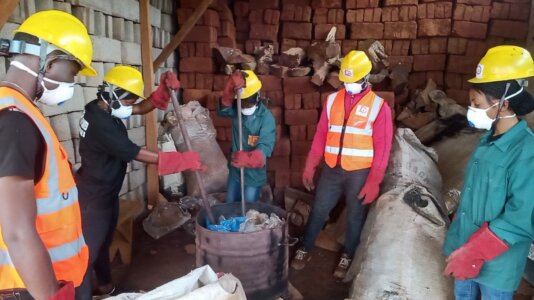- About
- Topics
- Picks
- Audio
- Story
- In-Depth
- Opinion
- News
- Donate
- Signup for our newsletterOur Editors' Best Picks.Send
Read, Debate: Engage.
| April 11, 2023 | |
|---|---|
| topic: | Sustainable Development |
| tags: | #Cameroon, #food waste, #deforestation, #health |
| located: | Cameroon |
| by: | Njodzeka Danhatu |
Ojong Caroline Ayabi, a farmer from the town of Tiko in Cameroon’s Southwestern region, said her health has greatly improved ever since she stopped using firewood - which for decades had been her primary source of cooking energy. Ayabi had developed sight complications due to the smoke that emanates from fuelwood, especially when not properly dried.
"Smoke from firewood usually affects my eyes, causing tears to come out of them," she told FairPlanet, "and at certain points it itches, too, coupled with a runny nose."
When smokeless charcoal was developed, the 32-year-old mother of two did not hesitate to give it a try. In addition to improving her eyesight, the charcoal has helped Ayabi reduce her work in the kitchen, she claimed, adding that it is more affordable than fuelwood.
Across Cameroon, and particularly in rural areas, over 80 percent of people still rely on fuelwood for energy. As a result, the population is vulnerable to diseases associated with indoor pollution, such as acute infections of the lower respiratory tract, chronic obstructive pulmonary disease, lung cancer, asthma, cataracts and tuberculosis.
Exposure to particulate matter from all sources of air pollution in the country was estimated to result in approximately 15,000 deaths and some 650,000 disabilities in 2016 alone.
Forests cover roughly 60 percent (28 million hectares) of Cameroon’s territory, FAO reports, adding that 12 million hectares (42 percent) of them are covered in a tropical rainforest. But the country’s lack of diversified energy sources and an over-reliance on fuelwood and cooking gas has made it difficult for the government to preserve its forested land.
Between 2001 and 2016, nearly 900,000 hectares of forest were lost to exploitation, despite Cameroon’s commitment to restore 12 million hectares of forest in the species-rich Congo Basin.
This comes as Cameroon’s demand for wood energy amounts to 6,560,000 tons per year, including 356,000 tons of charcoal; combined, firewood and charcoal contribute over FCFA 185 billion (USD 304 million) to Cameroon’s economy - roughly 1.3 percent of its GDP. This demand represents 2.5 million cubic metres and 12,500 hectares of natural forest destroyed each year.
Mboza Jerry Clinton Yengeh, Tabe Brandon Njume and Mohammadou Ousman Buba were all studying at the University of Buea in the capital of Cameroon’s Southwestern region when they were prompted to tackle the country’s deforestation, waste pollution and attendant health crises. In 2019, they embarked on a research investigating how to leverage food waste and transform it into eco-friendly fuel briquettes.
The three youths come from different villages across the country where nothing other than firewood was used for cooking energy. Growing up, they would notice the back of their pots blackened by smoke, which at times would flood their eyes and choke their throats.
Yengeh told FairPlanet that about 60 percent of deforestation in Africa - particularly in mangrove forests - is carried out to secure fuelwood. The long-term effects of this are an increase in carbon dioxide in the atmosphere, biodiversity loss and indoor air pollution, which is the primary cause of respiratory disorders resulting in premature deaths and an economic loss of $2.30 billion each year across Africa.
"80 percent of households in Africa depend on fuelwood for cooking, and women who are at the frontline - constituting 60 percent of the African population - are the most vulnerable to these respiratory disorders," Yengeh told FairPlanet. "Hence, there is a great need to move from the traditional fuelwood usage to a more sustainable, cheaper, environmentally friendly and health sound fuel briquettes made from agricultural waste."
He added, "It's in this light that we came up with the idea of leveraging on this waste, transforming them into useful resources that are consumable [and] more environmentally friendly."
With training from Dr Richard Munang, deputy regional director of the United Nations Environment Programme (UNEP) Africa office, the three examined methods using agricultural waste as a replacement for firewood that were developed in other countries, and mapped them onto Cameroon’s landscape and available resources.
After numerous trial and errors, a breakthrough finally came, and the three have been able to create a product that helps a growing number of households in Cameroon transition away from hazardous and environmentally-costly firewood, while reducing food waste in the process.
This is being done by adding value to agricultural waste to produce charcoal which is slowly becoming a substitute for fuelwood.
Speaking to FairPlanet, Mboza Jerry Clinton said that it is time to stop the blame game around deforestation. To him, action is what is needed. And together with his two friends, Clinton founded Greensphere - a climate action solution nonprofit based in Buea that works to distribute charcoal briquettes as a replacement to firewood and build awareness around its environmental and health benefits.
"The charcoal briquettes now branded as Bramolin Charcoal," said Tabe Brandon Njume, Greensphere’s co-founder, adding that it is gradually becoming a substitute for firewood.
This charcoal is cheaper, smokeless, odourless and stainless. The investors argue that the briquettes’ relatively low price ($0.8 per kilogram compared to $13 for an equivalent amount of cooking gas or $1.3 for a bundle of firewood) could increase household savings by 20 percent and increase income availability for other profitable pursuits.
The briquettes are sold through direct sales (order placing and delivery) and a via network of distributors at certain junctions in major towns across Cameroon, but mostly Buea, Yaounde, and Douala.
An additional benefit, they stressed, would be reduced deforestation rates in Cameroon, meaning more trees will be conserved and act as carbon sinks.
The invention, they claim, will therefore help promote Sustainable Development Goals (SDGs) 3, 7 and 13 (Good Health and Wellbeing, Affordable and Clean Energy and Climate Action).
In 2021, they won first prize from the Setcam Foundation for innovation. The prize of XAF 1,000,000 ($1,643) was awarded on the grounds that aside from rescuing the forest, the charcoal produce is affordable, sustainable and helpful to households.
FairPlanet visited Bramolin Charcoal’s production site in Tiko. The process starts with the collection of raw materials, including rice husks, plantain peelings, and maize stems, among others, which are subsequently dried and carbonised in order to get rid of volatile compounds and moisture. This leaves a fuel with a higher proportion of carbon (char), which is then bound with the use of starch.
"High temperature can melt a naturally occurring substance called lignin, and under pressure this acts as a glue," Njume explained. "But since it's a manual process, we are using binders like cassava flour, molasses, wheat flour, fine clay and red soil." He added that cassava starch used for binding happens to be more effective.
They do this by placing the briquettes into a moulder and applying force to shape the briquette. The briquettes are then laid out to dry in the sun on polythene, iron sheets or a wire mesh. This process, called sun-drying, can take up to three to four days.
Mboza said that seeing as they make the briquettes manually, they have been unable to scale their operations thus far and meet the growing demand from households. At the moment, they produce between 10 to 15 tonnes of charcoal annually.
The inventors are pleading with the Cameroonian government to provide them with aid so they could purchase sophisticated machines and produce millions of tonnes of briquettes annually in order to properly tackle what they describe as an alarming rate of deforestation in the country.
To secure raw material for their product (which can be quite challenging at times), the entrepreneurs have negotiated a barter with farmers who - after undergoing training - provide them with crop residue with lower moisture content in exchange for charcoal briquettes. They have a similar partnership with households that supply waste in return for their products.
Since their actions are geared towards environmental protection and building resilience in the fight against climate change, they train other youths, especially women, on how to adopt their charcoal production method. The trainees gather the waste material in exchange for instruction on how to transform it into charcoal briquettes and sell their finished product.
100 youths have been trained so far, and production sessions take place on a weekly basis.
When the project was first launched, Dr Richard Munang tweeted "#ClimateAction is a need not a choice. Inspiring willing #youths #skillsretooling the hallmark of #innovativeVolunteerism is now happening across #Africa. We are seeing young coming up with local technologies to turn agricultural waste into fuel #briquettes #mitigation."
Image by Njodzeka Danhatu.
By copying the embed code below, you agree to adhere to our republishing guidelines.


